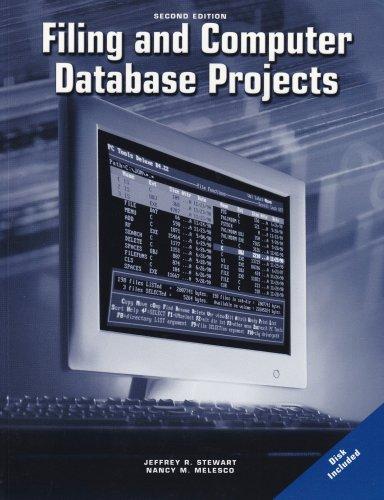Question
Write a C++ program that will accept infix expressions (like 5*(4+8)) and convert them to postfix. You are to use Dijkstra's algorithm for converting. The
Write a C++ program that will accept infix expressions (like 5*(4+8)) and
convert them to postfix. You are to use Dijkstra's algorithm for converting.
The stack routines are to be defined as methods in a class and are to be in a separate file.
Dijkstra's Algorithm:
Read in 1 line into a string
Print the string
while there are characters left to process in the string
-----
| get a token (skip over blanks)
| if the token is a digit then output(token)
| else
| -----
| | if the token is '(' then push(token)
| | else
| | -----
| | | if the token is ')' then
| | | -----
| | | | while the top item is not '('
| | | | pop(temp) and output(temp);
| | | | pop(temp)
| | | -----
| | | else
| | | -----
| | | | if the stack is empty then push(token)
| | | | else
| | | | -----
| | | | | while the stack is not empty
| | | | | and the priority (token) <= priority (top item on the stack)
| | | | | pop(temp) and output(temp)
| | | | | push(token)
| | | | -----
| | | -----
| | ----
| -----
-----
while the stack is not empty do pop(temp) and output(temp)
Precedence of the Operators:
operators : ^ * / + - (
precedence: 3 2 2 1 1 0
where ^ means exponentiation
input for the assignment:
2 + 3 * 5
2 + 3 * 5 ^ 6
2 + 3 - 5 + 6 - 4 + 2 - 1
2 + 3 * (5 - 6) - 4
2 * 3 ^ 5 * 6 - 4
(2 + 3) * 6 ^ 2
Output for the assignment
1: 2 + 3 * 5
235*+
2: 2 + 3 * 5 ^ 6
2356^*+
3: 2 + 3 - 5 + 6 - 4 + 2 - 1
23+5-6+4-2+1-
4: 2 + 3 * (5 - 6) - 4
2356-*+4-
5: 2 * 3 ^ 5 * 6 - 4
235^*6*4-
6: (2 + 3) * 6 ^ 2
23+62^*
Write a C++ program that will accept infix expressions (like 5*(4+8)) and
convert them to postfix. You are to use Dijkstra's algorithm for converting.
The stack routines are to be defined as methods in a class and are to be in a separate file.
Dijkstra's Algorithm:
Read in 1 line into a string
Print the string
while there are characters left to process in the string
-----
| get a token (skip over blanks)
| if the token is a digit then output(token)
| else
| -----
| | if the token is '(' then push(token)
| | else
| | -----
| | | if the token is ')' then
| | | -----
| | | | while the top item is not '('
| | | | pop(temp) and output(temp);
| | | | pop(temp)
| | | -----
| | | else
| | | -----
| | | | if the stack is empty then push(token)
| | | | else
| | | | -----
| | | | | while the stack is not empty
| | | | | and the priority (token) <= priority (top item on the stack)
| | | | | pop(temp) and output(temp)
| | | | | push(token)
| | | | -----
| | | -----
| | ----
| -----
-----
while the stack is not empty do pop(temp) and output(temp)
Precedence of the Operators:
operators : ^ * / + - (
precedence: 3 2 2 1 1 0
where ^ means exponentiation
input for the assignment:
2 + 3 * 5
2 + 3 * 5 ^ 6
2 + 3 - 5 + 6 - 4 + 2 - 1
2 + 3 * (5 - 6) - 4
2 * 3 ^ 5 * 6 - 4
(2 + 3) * 6 ^ 2
Output for the assignment
1: 2 + 3 * 5
235*+
2: 2 + 3 * 5 ^ 6
2356^*+
3: 2 + 3 - 5 + 6 - 4 + 2 - 1
23+5-6+4-2+1-
4: 2 + 3 * (5 - 6) - 4
2356-*+4-
5: 2 * 3 ^ 5 * 6 - 4
235^*6*4-
6: (2 + 3) * 6 ^ 2
23+62^*
Programming Notes:
The stack routines are to be defined as methods in a class and are to be in a separate file.
Step by Step Solution
There are 3 Steps involved in it
Step: 1

Get Instant Access to Expert-Tailored Solutions
See step-by-step solutions with expert insights and AI powered tools for academic success
Step: 2

Step: 3

Ace Your Homework with AI
Get the answers you need in no time with our AI-driven, step-by-step assistance
Get Started


